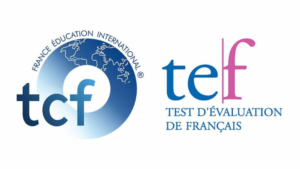The DELF A1 exam is for beginners who have a basic understanding of French. One of the key components of the DELF A1 oral examination is the “ÉCHANGE D’INFORMATIONS” section, which requires candidates to exchange information with the examiner for about two minutes.
Understanding the ÉCHANGE D’INFORMATIONS Section
This section is important for testing your ability to use French in real-life scenarios. You will be asked to engage in a short dialogue with the examiner, where you will need to ask and answer questions, provide personal information, and respond to simple prompts.
There are some key skills required such as
- Understanding the examiner’s questions and prompts.
- Providing clear, accurate, and relevant responses.
- Engaging in a natural and coherent conversation.
- Demonstrating correct pronunciation and intonation.
- Using appropriate vocabulary for everyday situations.
The topics for this section are usually centered around daily life and personal information. Here are some common areas you might be asked about personal information, hobbies and interests, daily routine, preferences, basic needs. There are some basic preparation tips.
- Practice Common Questions and Answers: Familiarize yourself with common questions you might be asked, and practice giving clear and concise answers
For example:
Examiner: “Comment vous appelez-vous?” (What is your name?)
Candidate: “Je m’appelle Marie.” (My name is Marie.) - Expand Your Vocabulary: Learn and practice vocabulary related to everyday activities and personal information. Flashcards and vocabulary lists can be particularly helpful
- Engage in Role-Playing: Practice with a friend or language partner by simulating the exam conditions. Take turns being the examiner and the candidate to get used to both asking and answering questions
- Listen to Native Speakers: Use resources like French podcasts, YouTube channels, or language learning apps to improve your listening skills and get used to the natural rhythm and intonation of spoken French
- Record Yourself: Record your practice sessions and listen to them to identify areas for improvement in pronunciation and fluency
Related: Simple Steps To Write A Basic French Vacation Postcard At A1 Level!
Example
Échange d’informations – 2 minutes environ
1. Heure:
A- À quelle heure vous levez-vous ?
B- À quelle heure arrivez-vous au bureau?
2. Bureau
A-Quelle est votre profession?
B-Travaillez-vous avec beaucoup de collègues ? Ou seul?
3. Bibliothèque
A-Aimez-vous lire?
B-Dans votre famille, êtes-vous la seule personne qui lis ?
4. École
A-Aimez-vous étudier ? Quelle est votre matière préférée ?
B-Quels sont vos loisirs ?
5. Langue
A- Combien de langues parlez-vous ?
B- Dans quelle langue, préférez-vous lire des romans?
Tips for the Exam Day
- To control the nervousness always take a deep breath before you start.
- Pay close attention to the examiner’s questions to ensure you understand them correctly before responding.
- Pronounce your words clearly and at a moderate pace. Avoid speaking too quickly.
- Use polite forms of address and expressions, such as “s’il vous plaît” (please) and “merci” (thank you).
- If you don’t understand a question, politely ask the examiner to repeat or clarify it. For example: “Pouvez-vous répéter, s’il vous plaît?” (Can you repeat, please?)
Conclusion
By practicing common scenarios, expanding your vocabulary, and engaging in regular role-playing exercises, you can build the confidence and skills needed to perform well. Remember to stay calm, listen carefully, and speak clearly.
To know and learn more, check out learnfrenchenligne.








